
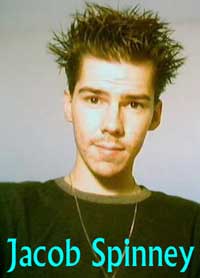 This page will be posted while the entire JREF is in Las Vegas at The Amaz!ng Meeting 2, and I hope that those attending will check in to read it, particularly because the author of our opening piece will be present. You may wish to meet him and discuss his comments….
This page will be posted while the entire JREF is in Las Vegas at The Amaz!ng Meeting 2, and I hope that those attending will check in to read it, particularly because the author of our opening piece will be present. You may wish to meet him and discuss his comments….
My name's Jacob Spinney. I am an 18-year-old student from Phoenix, AZ.I must tell you of an experience that I've recently had. In late September of last year I was invited by a fellow student in my Video Production class to attend his Christian Youth Group. At first I didn't see any reason in going since I'm as atheist as they get. But I figured that if I don't give him a chance to have me hear out what his youth group has to say, he wouldn't give me a chance to hear out what I have to say. So I went, and tried my very best to be as respectful and polite as I could in hopes that I would represent atheists in a good light. After the sermon, word spread like wildfire about my atheism and the reaction wasn't what I'd predicted. Rather than asking me to leave, they were intentionally kind and curious. I later found out this was mostly because they saw me as one of those (supposed) atheists that easily convert if you tell them about the original sin and salvation spiel. But unlike most of the "atheists" that they normally bump into, I'm not the kind of atheist who would ever convert to a belief just because of an emotional appeal. I need evidence, and after I made this clear, they told me about a "retreat" they were having. In this retreat they were going to have an author/"campus crusader," Tom Short, speak on the proof that shows "Christianity is a thinking persons religion." So I signed up basically for the ability to honestly tell myself that I gave Christianity a chance.
A few weeks before the retreat, my Christian friend from Video Production gave me Short's book, "5 Crucial Questions about Christianity." I read it, and was disappointed with the book. I know that it's meant to affirm a "thinking" Christian's beliefs, but the evidence presented is nothing new. Same old causation/design arguments with which I won't bother filling up this email. But I decided to write my own rebuttal to his book to show my Christian friends that I don't just look at a Christian book and dismiss it as propaganda, as they do with atheist books. You can find my rebuttal at http://jacobandrews.com/tomshort.htm. When I finally got to the retreat, Tom Short made his speech, and I was really disappointed to find out that his speech is basically summing up all of the things he talked about in his book, almost word-for-word. So, after Mr. Short's speech, I gave him a printed copy of my rebuttal and he said he'd read it and tell me what he thought, the next day.
Well, in the morning of the next day, he approached me and basically told me that he would e-mail me his response, and that it would be "inappropriate" for me to show anyone my rebuttal to his book. I reluctantly acquiesced to his request out of politeness, but one is left to think, if Christianity is a thinking persons religion, wouldn't that necessitate learning the opposing viewpoint before coming to a conclusion?
It's now been more than a month since I presented him with my rebuttal, and no response. But my e-mail box is still open.
After the retreat, I still went to the youth group, off and on, to stop by and say hi to everyone. I guess it became obvious that I wasn't going to convert to Christianity, and I received an e-mail from one of the ministers of the group. He informed me that I am "being used as a tool of the devil himself" and I "have been revealed as someone who wants nothing more than to tear down those that Love the Lord." I had this preconceived notion that Christianity's door is always open, but this seems to apply only to those who are willing to go along with the program fast enough.
I'm sure that readers can see the understandable fear that Jacob's actions stirred up in this group. As with any believers who eagerly accept an attractive idea without demanding evidence for it, they then make a great show of being open to discussion and expression on the matter, but close down quickly as soon as they recognize that they have to actually get involved in examining their beliefs and the reasons behind them. People like Jacob Spinney are the worst thing that can happen to them, and they hasten to slam their doors shut so they can huddle together under the bed, safe from the bogey-man.
But seriously, folks, how can we believe that a supposedly educated man like the minister who wrote Jacob, really believes (a) that Jacob Spinney is a tool of this mythical Satan character, (b) that he got a revelation about this from some supernatural source, and (c) that the members of this group can be "torn down" by discussion of their beliefs? Don't answer that; I think I know….
Hey, Jacob, way to go! And say hello to Satan for me when you next get together!
(Please, spare me the pious caveats about my impatience with such matters. I'm a thinking, rational, adult, and I don't have to cater to these silly notions by being "nice" about them. Nor should you.)
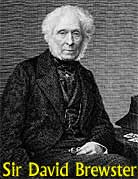 Scotsman Sir David Brewster (1781-1868) was a remarkable intellect. Though he is — unfairly — best known for his invention of the kaleidoscope, he also developed the mathematics of the polarization of light, and made substantial improvements in the design of the stereoscope, besides many other accomplishments. I have come into possession of one of his better-known books, "Letters on Natural Magic" (1842), in which he discussed many oddities of the kind that fascinated learned persons of his day.
Scotsman Sir David Brewster (1781-1868) was a remarkable intellect. Though he is — unfairly — best known for his invention of the kaleidoscope, he also developed the mathematics of the polarization of light, and made substantial improvements in the design of the stereoscope, besides many other accomplishments. I have come into possession of one of his better-known books, "Letters on Natural Magic" (1842), in which he discussed many oddities of the kind that fascinated learned persons of his day.
Brewster was, in many ways, rather naïve about the real world. For example, he was totally deceived by the old "lifting-with-the-fingers" stunt in which four persons standing around a fifth would lift that person from a seated position, in an apparently miraculous manner. See www.randi.org/jr/05-15-2000.html.
Remarkably, this highly-intelligent man seems to have believed in a quite incorrect solution to this stunt. He described a variation of the classic version which used only the forefingers of the "lifters," with the "liftee" seated in a chair. In his version any grip on the body of the subject seems to have been permitted. Brewster described the procedure thus:
One of the most remarkable and inexplicable experiments relative to the strength of the human frame which you [Sir Walter Scott] have yourself seen and admired, is that in which a heavy man is raised with the greatest facility, when he is lifted up the instant that his own lungs and those of the persons who raise him are inflated with air. This experiment was, I believe, first shown in England a few years ago by Major H., who saw it performed in a large party at Venice under the direction of an officer of the American navy. As Major H. performed it more than once in my presence, I shall describe as nearly as possible the method which he prescribed.The heaviest person in the party lies down upon two chairs, his legs being supported by the one and his back by the other. Four persons, one at each leg, and one at each shoulder, then try to raise him, and they find his dead weight to be very great, from the difficulty they experience in supporting him. When he is replaced in the chair, each of the four persons takes hold of the body as before, and the person to be lifted gives two signals by clapping his hands. At the first signal he himself and the four lifters begin to draw a long and full breath, and when the inhalation is completed, or the lungs filled, the second signal is given, for raising the person from the chair. To his own surprise and that of his bearers, he rises with the greatest facility, as if he were no heavier than a feather. On several occasions I have observed that when one of the bearers performs his part ill, by making the inhalation out of time, the part of the body which he tries to raise is left, as it were, behind.
As you have repeatedly seen this experiment, and have performed the part both of the load and of the bearer, you can testify how remarkable the effects appear to all parties, and how complete is the conviction, either that the load has been lightened, or the bearer strengthened by the prescribed process.
Yes, the effects do appear remarkable, but not at all beyond explanation. First, it's obvious that the weight has been distributed fairly equally among the four lifters. Thus, each person lifts one-quarter of the total, though "no heavier than a feather" hardly describes the reality. But how do we explain the apparent dramatic decrease in weight? Lifting a relatively "relaxed" or floppy weight is much more difficult and awkward than lifting a more rigid load. When all five participants take in a deep breath, and particularly when that action is performed in unison, the lifting procedure is much easier. The person being lifted is naturally much more rigid than previously, thus more easily handled, and the lifting action is synchronized.
Continuing his description, Brewster relates another similar "experiment" which meets more closely the classic description of this trick:
At Venice the experiment was performed in a much more imposing manner. The heaviest man in the party was raised and sustained upon the points of the forefingers of six persons. Major H. declared that the experiment would not succeed if the person lifted were placed upon a board, and the strength of the individuals applied to the board. He conceived it necessary that the bearers should communicate directly with the body to be raised.
Whoever "Major H." was, he failed to realize that trying to lift a hard object like a board on the tip of the finger is rather painful, entirely unlike the experience of poking one's finger into a relatively soft human body! But here we see the semi-mystical aspect of this description which implies that actually touching the body, albeit through clothing, is somehow a closer-to-nature way of going about things.
Brewster somewhat rescues himself at the conclusion of his description with this disclaimer:
I have not had an opportunity of making any experiments relative to these curious facts; but whether the general effect is an illusion, or the result of known or of new principles, the subject merits a careful investigation.
I've noted another event that Sir David Brewster described in the same chapter of his book, this one involving a character we've already met back on our web pages at www.randi.org/jr/01-19-2000.html and www.randi.org/jr/02-03-2000.html where Baron Wolfgang von Kempelen (1734-1804) is mentioned in connection with a demonstration of a "talking engine"- something that "mechanicians" (we'd call them, "mechanics" or engineers) had been trying to make for many years. This was a mechanical way of reproducing the human voice, using systems of air pumps, valves, reeds, and funnels, that could be manipulated by an experienced operator to produce at least the basic sounds — consonants and vowels — and, ideally, actual words of speech.
Brewster described the work of well-known technicians such as a gentleman named Kratzenstein, who demonstrated in 1779 how he could obtain the fundamental vowel-sounds. It seems very much as if this was a genuine demonstration of this man's ingenuity, but then Brewster described a quite different matter: referring to Baron von Kempelen as, "a celebrated mechanician of Vienna," he cited the "long study, and diligent examination" entered into by von Kempelen to produce actual words and sentences, and he says that these efforts were successful:
There seems to be no doubt that [von Kempelen] at last was able to produce entire words and sentences, such as, opera, astronomy, Constantinopolis, vous êtes mon ami, je vous aime de tout mon coeur, venez avec moi à Paris, Leopoldus secundus, Romanorum imperator semper Augustus, etc,; but he never fitted up a speaking figure, and probably, from being dissatisfied with the general result of his labors, he exhibited only to his private friends the effects . . .
Brewster refers here to the expected possibility of von Kempelen preparing a "speaking figure," probably recalling the famous chess-playing "automaton" for which he was already so very famous, and which he had first put on public display a decade earlier. Knowing, as we do now, that the automaton was a fake, having a human being concealed within it, we read the continuation of Brewster's description in a new light:
. . . of the apparatus, which was fitted up in the form of a box. This box was rectangular, and about three feet long, and was placed upon a table and covered with a cloth. When any particular word was mentioned by the company, M. Kempelen caused the machine to pronounce it, by introducing his hands beneath the cloth, and apparently giving motion to some parts of the apparatus.
Was that an "Aha!" moment for you? It certainly was for me. It sounds very much as if this clever rascal simply substituted a French-speaking concealed-in-the-box confederate for the chess-player he'd previously used for the former stunt! Why the "French" connection (pun intended)? Read on about what Brewster says:
Mr. Thomas Collinson, who had seen this machine in London, mentions in a letter to Dr. Hutton, that he afterward saw it at M. Kempelen's own house in Vienna, and that he then gave it the same word to be pronounced which he gave it in London, viz. the word Exploitation, which, he assures us, it again distinctly pronounced, with the French accent.
With a French accent? I wonder why? Von Kempelen, on one occasion at least, specified that there were language preferences for this machine to operate with. It was easier, he said,
. . . if one chooses the Latin, French, or Italian language, since German is much more difficult because of its many closed syllables and consonant clusters.
Being of a suspicious nature, I see here the possibility that his concealed man-in-the-box was French, and might have had difficulty with the German language. What do you think?
Science writer John P. Cater is the author of a 1983 article, "Electronically Speaking: Computer Speech Generation," in which he apparently accepts that von Kempelen actually had a "talking" machine that could perform as advertised. Perhaps he did. However, you may agree with me that performing over a mysterious box large enough to hold a human being, with your hands underneath a concealing cloth, smacks of some sort of deception. There is a strong possibility here that von Kempelen was only doing trickery during this particular demonstration, and might well have had an actual device which he had developed to mimic some parts of speech. His previous history gives us good reason to believe that he could have — and probably would have — resorted to tricks, if and when he had to.
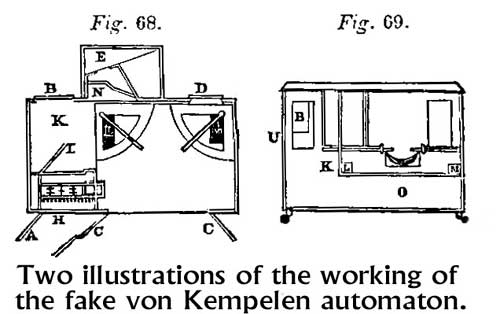 What fascinates me most of all here is the fact that Sir David Brewster didn't express this same possibility, especially since later on in the same book that we're discussing here, he describes in detail the very strong suspicion that the von Kempelen chess-playing device was a fake, and probably did contain a human being as the operator! He devotes a whole thirteen pages and ten illustrations to an exposé of this trick, but never connects the "talking engine" demo by von Kempelen with the far more renowned and celebrated chess-player fraud perpetrated by the same man!
What fascinates me most of all here is the fact that Sir David Brewster didn't express this same possibility, especially since later on in the same book that we're discussing here, he describes in detail the very strong suspicion that the von Kempelen chess-playing device was a fake, and probably did contain a human being as the operator! He devotes a whole thirteen pages and ten illustrations to an exposé of this trick, but never connects the "talking engine" demo by von Kempelen with the far more renowned and celebrated chess-player fraud perpetrated by the same man!
I'll just add one more note here: Sir David, despite his substantial contributions to the science of his day, balked at accepting the discoveries of Charles Darwin, since he was a confirmed creationist. As we've said before, even the most intelligent and dedicated thinkers can refuse to face reality when it conflicts with their preferred philosophies.
Through one of his devoted followers, via our reader Tim Rasmussen in Glendale, California, here is a response from Hira Ratan Manek, one of the fakers who says he does not eat any food and survives on solar energy only by looking at the sun. We mentioned him on the July 11th and July 18th pages. It's not the other orange-robed man, Prahlad Jani, who we wrote about three weeks ago. Here's Manek's response, exactly as received:
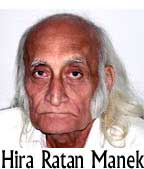
thanks and i know this man from fort lauderdale and he is totally against new ideas and though he has a award scheme he has so far not given to any one and his motives are for the people to judge.I do not bother about such people because it is for the masses to decide for themselves.Every thing has two sides.There are people who do not believe in god but that does not mean that i should not believe it.It is an individual choice.I do not insist on people to believe what i say but just share my experiences witrh them and leave it to them to decide for themselves.As far as nasa is concerned if some officer expresses ignorance does not mean to contrary and such things happen with such big organisations specially when they lack coordination and which is very much with nasa nowdays specially after columbia crash.Many committees have resigned from nasa and so on.I am happy that lot of people all over the world now believe in this and many are practising and finding it successful.It is the success of phenomina that is important and not the negative sayings by people like randi.etc.thanks hrm
End quote. Gee. I guess that NASA and I have been officially told off. I'll go stand in the corner for a while….
This is right in line with what all of these miracle-mongers resort to: insults, changing the subject, outright lies, weaving and bobbing to avoid admitting that they simply will not be tested, nor will they prove their claims. No surprises: the fakers are still faking it. This one doesn't look at all happy….
An interesting note from a young reader:
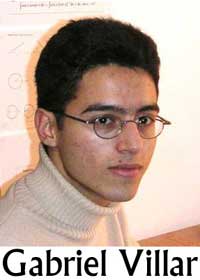
My name is Gabriel Villar, and I am currently studying for my A-Levels (final year of school in England), and am planning to study Physics in university next year. I am a regular reader of your excellent website, and I would like to share a conclusion that I have come to recently concerning religion. Please forgive the lecturing style, as I am planning to put this to a religious friend of mine. I would appreciate your opinion on my thoughts.It seems to me that a god is simply unnecessary. For example, atomic theory was invented in order to explain all sorts of phenomena, the wave theory of light was in part created out of observations of interference patterns, the photon theory of light came from the discovery of the photoelectric effect, and so on. That is to say, an observation requires a theory for its explanation.
However, what observation requires a god in order for it to be explained? In other words, what can we explain with a god that we could not explain without one? Nothing. Some religious people may point out that scientists do not know everything, for instance how the universe began. This is true, but it does not imply that there is a god. For example, let us say that I have two solutions that modern chemistry has just synthesised. Let us also say that nobody has any idea what is going to happen when I mix the two solutions. Does this mean that there is a god? Certainly not, and this is no different to the beginning of the universe: it is just another physical phenomenon.
Hence, the idea of a god is superfluous, much like a theory of a particle that does not interact with anything. A good theory should explain observations (which religion does not) and predict other observations (again, which religion fails to do). Like you said, although one cannot prove that "that there is not a Barbie doll on the Moon", there is no evidence for it, and so there is no reason to believe it. If you replace "Barbie doll on the Moon" with "a god", the argument is identical, and equally well founded.
Thank you for your time, and your thought-provoking work.
I responded: Gabriel, you must remember that inventing a deity greatly simplifies life for the believer, and makes thinking unnecessary. If there's a puzzle — "why am I here? — for example, the "God" card trumps all others, immediately and completely, with no discussion or work needed. No, the invocation of a deity doesn't explain a difficult quandary, but it makes an answer unnecessary, for the believer.
Gods are children's blankets that get carried over into adulthood.
Last week I defined "dyspnea" as, "dizziness." Wrong. I had asked a person I believed authoritative, and he misinformed me. A severe cudgeling followed. It means, "shortness of breath." Which, when you think about it, might lead to dizziness…. Hold those cudgels!
You'll remember Erin Halligan from our www.randi.org/jr/112803linda.html webpage. Well, reader and fellow-skeptic Brian Madigan tells us that the Central New York Skeptics are pleased to announce that she will be presenting the results of her experiment entitled "For Entertainment Purposes Only: The Genesis of Belief" at their January meeting at 7 pm on Wednesday, January 21st, at the Bett's Branch Library in Syracuse, NY. More details may be found on their web page: www.cnyskeptics.org.
UK contributer John Atkinson asks us, "Ready for some nonsense?" then tells us that their Sun newspaper claims that their astrologer, "Mystic Meg," helped a cleaner win £9.3 million:
Meg's stars for Mary in last Saturday's Sun said: "Your prize luck is looking good, so it's worth picking up a lottery ticket." Mary, an Aquarius, said: "It just goes to show the horoscopes do come true. Mystic Meg was certainly accurate this time."
Well, since about 8% of those in the UK are Aquarians, and certainly some of those — a few million? — invested in the lottery, how is it that only Mary won…? These are things beyond my intellect altogether. But reader Stuart Bennett, commenting on the full-Moon-rising question of last week, comments:
That one's not too much worse than "why is the sky blue?" The real kicker, I have found, is trying to convince people that space itself isn't actually cold.
So that's the question for this week. No, not the blue sky, the non-cold-space matter. And for those who didn't figure it out, the answer to the full Moon question is, "Just after sunset." A full Moon has to be directly lined up with the Earth and the Sun, to be fully-lit from our point of view….
That's all, folks. I'll hustle to get another page ready in time for next week, if and when I recover from TAM2….!
